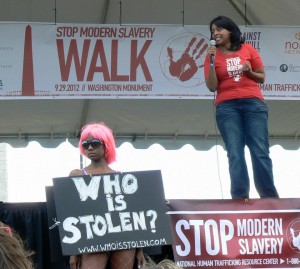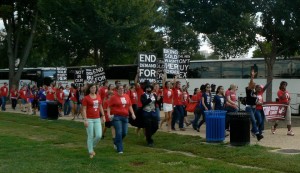The Danya Institute is pleased to present this regular series of orignal articles on trends in the field of behavioral healthcare. Our latest article is by special guest author Abby Charles, MPH, Program Manager at CommonHealth ACTION on Human Trafficking and HIV in DC.


“It ought to concern every person, because it’s a debasement of our common humanity. It ought to concern every community, because it tears at the social fabric. It ought to concern every business, because it distorts markets. It ought to concern every nation, because it endangers public health and fuels violence and organized crime. I’m talking about the injustice, the outrage, of human trafficking, which must be called by its true name—modern slavery.”
–President Barack Obama, September 25, 2012[i]
On September 29, 2012 thousands of people took to the streets of Washington, DC for the 2012 Stop Modern Slavery Walk. This annual walk, held on the National Mall, brought together thousands from the DC community with dozens of local, national, and international nonprofit organizations to raise awareness and increase funding to end human trafficking[ii]. The walk created a great deal of buzz in the DC region, which has led me to do some research on the issue. In a scan of recent news articles I came across a story released by the US Attorney’s office on September 14, 2012. The article recounts a conviction in Virginia that illustrates the complex exploitation issues people who are trafficked face[iii]:
…After the victims were initiated into the scheme, the gang members would purchase condoms at local pharmacies and convenience stores, provide the victims with drugs and alcohol and drive them to neighborhoods in Alexandria, Springfield, and Arlington, Virginia…As part of the operation, the victims were instructed to find apartments with multiple males inside to minimize walking in the open and to maximize profit. The gang advertised their victims through online sites such as Craigslist.org and Backpage.com and solicited customers for “in-call” prostitution services that were provided in the basement of the leaders home. The going rate for sex with an underage girl typically was $30-$40 for 15 minutes of sex, and each victim often had sex with multiple men in one night—usually about 5-10 customers—and over the course of multiple weekdays or weekends, including as much as seven days a week.[iv]
I could not stop thinking about how vulnerable these trafficked persons were to violence and HIV & STD infection, and how limited our HIV prevention and care programs are at reaching this population. This then led me to this question: Are we doing our best to address their needs? In a city where HIV prevalence rates are among the highest in the country, what role does human trafficking play in exposing individuals to HIV, and how does this crime affect access to HIV care for persons living with HIV?
What is human trafficking?
The U.S. Trafficking Victims Protection Act (TVPA) states that human trafficking has occurred if a person was induced to perform labor or a commercial sex act through force, fraud, or coercion. Any person under age 18 who performs a commercial sex act is considered a victim of human trafficking, regardless of whether force, fraud, or coercion was present.[v] Traffickers prey on those who are vulnerable, such as migrants, refugees, ethnic minorities, women and children, but trafficking can affect anyone.
Today, there are an estimated 27 million individuals who are trafficked around the world, including within our DC Area communities. Little reliable data exist about the exact scale of human trafficking in the DC metropolitan area because often this crime is clandestine. This is not surprising. How many of us have worked with or know of a young girl or woman who is a survivor of sexual exploitation, but who has never reported it because of fear of criminalization for their drug use or prostitution?
How does human trafficking relate to HIV?
According to the United Nations, “where data exist, the prevalence of HIV infection has shown to be disproportionately high among people trafficked for the purpose of sexual exploitation, ranging from 40% to up to 90%.”[vi] The risk of HIV infection is directly related to conditions in which sexual exploitation occur. Specifically, trafficked persons may be subjected to high numbers of clients, violent and/or unprotected sex, poor hygiene, voluntary or induced drug use including unsafe injecting practices, and inadequate screening and treatment of common sexually transmitted infections. In addition, because of the concealed nature of trafficking, trafficked persons are often not reached by HIV prevention or care services. In the DC region, these factors coupled with high HIV prevalence make this issue especially concerning.
What can we do?
We must talk more about this issue. The topic of trafficking touches on some of the most sensitive issues in our communities such as sex, exploitation of vulnerable populations, prostitution, drug use, and violence against women and children. Understanding these interrelated issues is necessary for coming up with the most effective solutions.
We must engage survivors in developing the solutions. I do not have the answers for how to effectively provide HIV prevention and care services for persons who are trafficked.Nevertheless, effective engagement of survivors of human trafficking is important to develop successful interventions that address, substance use, mental health and HIV among this vulnerable population. It is our responsibility to ensure that people vulnerable to human trafficking receive evidence-informed comprehensive and cross-disciplinary HIV prevention, treatment and care services.
We need to challenge our funders and policy makers to address human trafficking. These advocacy efforts are critical not just in the the nation’s capital but also nationally. We must commit to addressing human trafficking and HIV in a more integrated manner, through both programs and policies.
We who are working in the HIV field must do more than what we are doing now. This is a national problem that requires our focused attention on people who are vulnerable to and survivors of human trafficking.
Human Trafficking Resources in DC:
- Polaris Project- http://www.polarisproject.org/
- Polaris Project’s national trafficking hotline number: 1-888-373-7888
- Fair Girls DC – http://fairgirls.org/about
- DC Human Trafficking Task Force: http://www.facebook.com/pages/DC-Human-Trafficking-Task-Force/191489050882793
[i] http://www.whitehouse.gov/the-press-office/2012/09/25/fact-sheet-obama-administration-announces-efforts-combat-human-trafficki
[ii] http://www.kintera.org/faf/home/ccp.asp?ievent=1012952&ccp=101900
[iii] http://www.fbi.gov/washingtondc/press-releases/2012/virginia-gang-leader-sentenced-to-40-years-for-leading-juvenile-sex-trafficking-ring
[iv] http://www.fbi.gov/washingtondc/press-releases/2012/virginia-gang-leader-sentenced-to-40-years-for-leading-juvenile-sex-trafficking-ring
